General Information
| Name of Organization | RUSTIC (Rural Unfortunates Safety Talisman Illumination Cottage ) |
|---|---|
| Year of Establishment | 1988 |
| Address | 115/32 Majid Sharani Sattar Biswas Sarak, Sonadanga, Khulna 9000, Bangladesh. Telephone: +880 4172 9421. Mobile: +880 1719 484330 E-mail: rustickln.bd@gmail.com www.rusticbd.org |
| Chief Executive | Moral Noor Mohammad, Ashoka Fellow (USA) |
| Legal Status | Registered with the Directorate of Social Welfare, People’s, Republic of Bangladesh, bearing, No. Khulna-537/93 dated May 31, 1993 NGO Bureau Vide Reg. No. 1949 dated July 25, 2004. and valid upto 25 July, 2019 |
| Working Area | Southwest Costal Region of Bangladesh |
RUSTIC Philosophy
Bangladesh is not a poor country by tradition and instead is a treasure trove for agricultural resources. Despite this fact, it is considered to be one of the poorest nations in the developing world. Natural disasters, lack of formal education, slow industrialization, and a lack of democracy translates into people having little voice in the governance of their country. The dream of building a developed nation is gradually fading away. Lack of transparency and accountability in the management of wealth translates into few people getting richer and most being pushed to the margin. The poor are unable break out of the vicious circle of poverty.
It is time to find an effective way to give hope for the survival and development of the left out majority. RUSTIC emerged to instill this dream into the left out majority. It is a non-profit and non-government voluntary organization, that works towards socio-economic and environmental development and bio-diversity conservation in Bangladesh.
RUSTIC’s Vision
Ran equitable and just society facilitated through self will and empowerment; it seeks to create a dignified and poverty free society.
RUSTIC’s Mission
“Poverty alleviation is well-known to the poor - only assistance is required.” It is essential to mainstream sustainable development to the backward, deprived, vulnerable, and affected men, women and children.
Strategic Objectives:
RUSTIC developed five strategic objectives to achieve its vision and materialize its mission:
- Organisation Building and Institutionalise Grass-Roots People;
- Education and Human Resource development;
- Sustainable Solid Waste Management and environment prtection;
RUSTIC utilizes its organizational resources to have a maximum impact on the organizational activities. It follows a two-fold strategy to improve access and enhance the supply of resources and services.
Firstly, in order to create local institutions it must develop needs-based awareness through individual or group approaches. These institutions will take an unequivocal stand for enhancing rights and empowerment.
Secondly, RUSTIC provides need based quality resources and services to the poor, vulnerable, and marginalized section. It mobilizes and utilizes internal and outsourced resources for the effective management of knowledge.
To strengthen mechanisms for better service delivery among the poor, RUSTIC develops partnerships, forums, alliances, networks, coalitions and the like to ensure the representation of a diverse range of institutional skills.
Cross Cutting Issues
For programme interventions, RUSTIC considers four issues:
- Women’s Rights: ensures gender equality, economic self-reliance of poor women, and a congenial atmosphere for women in the family, society and state.
- Child’s Rights: ensures four basic principles: the right to live, to development (i.e. the right to education), to safety, and to participation.
- Safe Environment: means taking steps in all the spheres of life and livelihood to reduce the risk of climate change effects, lessen carbon emissions, and decrease the global temperature. Locally, the risk reduction also means adaptation capacity.
- Poverty Reduction: means ensuring minimum standards of basic-human rights like nourishment (food, cloth), shelter, treatment, education and recreation to improve the standard of living. Development of skills, access to resources, income, employment, and dignified social status are also indicators of the issue.
A main objective of all the works implemented or underway by RUSTIC is to support these cross cutting issues.
Ongoing Programmes:
RUSTIC has been implementing the following two major programmes to achieve its strategic objectives:
- Vocational Training and Technical Support; and
- Sustainable Solid Waste Management.
5.1 Vocational Training and Technical Support
RUSTIC and Seven Hills Global Outreach, USA partnership in Bangladesh has so far (as of 31st December 2017) made the following achievements:
- Supported 520 adolescent girls to escape child marriage and continued a full year of education or vocational training. 5-Year Project Completion Report is available in Annex-A.
- Made available 3 clean water bore holes (Deep Tubewells) for hundreds of women, men and children in rural villages and urban slums. Project Completion Report is available in Annex-B.
- Established a vocational training center to provide vocational training on tailoring and embroidery to 60 adolescent girls per year. 2nd Year Project Progress Report is available in Annex-C.
RUSTIC has successfully demonstrated the effectiveness of the following development products:
- US$100/YEAR supports an adolescent girl to escape child marriage and continue a full year of educa-tion or vocational training.
- US$1800 allows us to make available a clean water bore hole for hundreds of women, men and children in rural villages and urban slums.
- US$250 purchases a used treadle sewing machine for a graduate of Seven Hills Vocational Training Program. With a sewing machine, a young woman can have a sustainable livelihood for lifetime.
5.2 Sustainable Solid Waste Management:
RUSTIC has been successfully running a beneficiary-community financed sustainable Solid Waste Management System to safely dispose off 2800 Metric Tons of Solid Waste and recycle the organic fraction to produce 480 Metric Tons of Compost (Organic) Fertilizer per year.
Residents in Khulna City generates around 300,000 Metric Tons of Solid Waste per year. Establishing a beneficiary-community financed sustainable Solid Waste Management System to safely dispose off these 300,000 Metric Tons of Solid Waste and recycle the organic fraction to produce 50,000 Metric Tons of Compost (Organic) Fertilizer per year works out to be 2.7 million US Dollars.
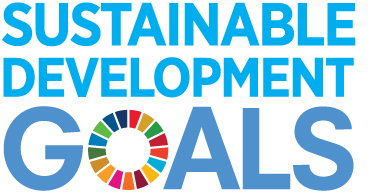 RUSTIC’s Model of SWMP has huge potentials to directly contribute to the following SDGs while it indirectly impacts on other SDGs.
RUSTIC’s Model of SWMP has huge potentials to directly contribute to the following SDGs while it indirectly impacts on other SDGs.
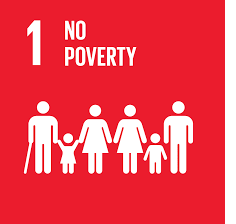 Creates 2,500 jobs for 2,500 families with per family annual income of 1,450 US Dollars. This enables the families to enjoy no poverty.
Creates 2,500 jobs for 2,500 families with per family annual income of 1,450 US Dollars. This enables the families to enjoy no poverty.
 Ensures sustainable environment in Khulna City and the city residents enjoy a great improvement in public health issues.
Ensures sustainable environment in Khulna City and the city residents enjoy a great improvement in public health issues.
 Reduces Green House Gas emissions within the city area.
Reduces Green House Gas emissions within the city area.
The programme requires a one-off grant to fund the initial capital costs and running costs for the initial six months. Thereafter the programme will be financially self-sustainable through collection of services from the waste generators and the sale proceeds of the compost (organic) fertilizers.
The leadership of the programme as been awarded fellowship from the Ashoka Fellowship for the Innovators, USA and also awarded the Climate Hero Award jointly sponsored by HSBC Bank and the Daily Star.
Detailes of the programme are available in Annex-D.
RUSTIC has successfully demonstrated the effectiveness of the following development products:
- US$3200 establishes a beneficiary-community financed sustainable Solid Waste Management System to safely dispose off 350 Metric Tons of Municipal Solid Waste and recycle the organic fraction to produce 60 Metric Tons of Compost (Organic) Fertilizer per year
- US$1800 establishes a customer-community financed sustainable Compost (Organic) Fertilizer Production System to recycle 240 Metric Tons of organic waste to produce 60 Metric Tons of Compost (Organic) Fertilizer per year.
- US$1400 establishes a beneficiary-community financed sustain-able Solid Waste Management System for door to door collection of 350 Metric Tons of Municipal Solid Waste and deliver those to secondary disposal units in Khulna City Corporation area.
Implemented Projects/Activiies:
6.1 Organization Building
RUSTIC executes the programme two steps: (1) enhancing groups of poor; and (2) building unity of local development initiators (NGOs, CBOs, etc.)
The primary target groups of RUSTIC are the isolated poor and hardcore poor grassroots families. This programme helps unite people at the grassroots level and strengthen their capacity.
RUSTIC focuses particularly on strengthening the capacity of the groups and making them self- motivated. To achieve this goal, group members are challenged to critically analyse themselves. They become involved in necessary skill development, income generating activities (IGA), and savings management activities. In addition, RUSTIC encourages all the groups to unite further through federations at village and union levels. Whereas the head of the groups and federations receive training from RUSTIC on leadership qualities, the rest of the general members participate in a series of awareness sessions. These include cross cutting socio-economic and political issues such as Women’s Rights, Child’s Rights, Safe Environment and Poverty Reduction. There are frequent exchanges and dissemination of information between RUSTIC and the groups and federations.
RUSTIC supports about 4,580 underprivileged people through 243 female and male groups. Each group has an average of 20 members who gather weekly for group meetings and money saving.
6.2 Local Resource Mobilization
RUSTIC is implementing this project with the financial support from Ashoka Innovators for the Public (USA). RUSTIC will continue organization building activities after phasing out of this project
6.3 Cooperative of Farmer
RUSTIC formed a local-based farmers’ association to market products and run a small trade of its group members. This association plays a supportive role to protect and preserve farmer’s various rights and privileges. This includes dealing with short-term capital crises, enhancing awareness of Fair Trade facts, and ensuring direct supply and fair price of their products.
6.4 Voter Education
RUSTIC believes that voters have a key role in ensuring and strengthening the democracy of a country. As a result, RUSTIC, in partnership with the development organization BROTEE, has implemented a project to strengthen citizens’ rights. The project activities include voter awareness and advocacy and focuses on vulnerable groups (women, religious and ethnic minorities, pre- and post-election observation and monitoring of national, Union Parishad, Pourasabha (municipality), City corporation and bi-elections in the country). RUSTIC implemented this project at Fakirhat, Mollahat and Chitalmari Upazilas of Bagerhat district between 2005 and 2009.
6.5 Local Government Strength
RUSTIC believes strengthening local government is essential for the sound contribution to the democratic process. To achieve its aims, RUSTIC aims to increase access and involvement of people in the governance.
6.6 Networking with Local NGOs
RUSTIC connects with various local forums, national forums and networks of development associations to enhance capacity of the development organisations, increase access to resources, and contribute to the policy planning. The Climate Change Effects Defender’s Association of Bangladesh (CEDAB network) is a noteworthy achievement as it is currently composed of 38 NGOs and a consultancy firm since July 2008.
6.7. Vulnerable Group Development Project at Morrelgonj,Bagerhat
RUSTIC implemented a three year project in the Morrelgonj area to assist in the development of vulnerable women. The area was specifically chosen because of its vulnerability to environmental disasters. For example the area is still dealing with the effects of a cyclone nearly three years ago. As a result, RUSTICs efforts are instrumental in improving the situation in the area today.
The project targets the poorest of the population: in particular over 2,800 women and their families. RUSTIC regional staffs begin by facilitating community meetings. These meetings facilitate dialogue and enhance awareness. Training sessions occur next, namely in the fields of environmental and rights protection. Staff members give tips and advice on what to do in case of emergency.
Following awareness training, the women are given practical training for future income generation. They choose which activity is most suitable to their needs and develop the skill for this field. After meeting with RUSTIC representatives, the women are eligible for credit to begin their project.
Though in its early stages, RUSTIC hopes this project will enhance the prosperity of the area and facilitate development. It will make the women more in control of their finances and provide an additional source of income for the family.
6.8 Integrated Organic Farming and Alternative Agriculture in the Waterlogged Area
The coastal area of Bangladesh is one of the most complex, biologically rich and productive ecosystems in the world. A previous Coastal Embankment Project was implemented to increase agricultural yield and protect human settlements. However, this project had adverse environmental impacts like enhanced siltation of rivers, drainage congestion and water logging in the area. As a result people started fisheries and other activities to fulfil their basic needs. Despite these steps, what the people really needed was a well-planned and integrated alternative agriculture system to ensure sustainability. To meet this need, RUSTI has been conducting similar activities in this programme.
Integrated organic farming is an innovation by RUSTIC. It provides skill development training on prawn-fish poly-culture, fish in paddy land, homestead gardening, vegetable cultivation on the pond banks or boundaries of agrarian lands, use of organic compost to protect soil quality, livestock, poultry rearing and many more. The programme also provides skill based training on agro based entrepreneurship such as the development of marketing and market channels, IGAs, integrated pest management and organic farming. The project activities include improving motivation and awareness building of its stakeholders through workshops, seminars, and distribution of posters and leaflets. RUSTIC continues the programme activities by providing necessary training and equipment supports, sharing the cost between beneficiaries and RUSTIC’s own funding sources after the project’s end.
6.9 Aquaculture
RUSTIC has acquired skills on aquaculture from the experience in different projects in the waterlogged areas and with different donors over last 15 years. Common objectives of these projects include creating part-time employment for rural unemployed people with have access to open water bodies (like rivers, canals, wetlands) or ghers, ponds, etc. Major projects implemented under the sub-components are:
- ‘Technology and information dissemination of prawn-fish poly-culture’ in collaboration with PROSHIKA (MUK), DAE and ASIRP (2001 to 2004),
- Cages Aquaculture, experimental technology transfer project, support by CARE Bangladesh (2002-2003) and
- ‘Aseptic Culture and Post Harvest Technology of Prawn & Shrimp’ in collaboration with Fisheries Ministry of GoB.
RUSTIC merged all the activities of above projects with own programmes and funds.
6.10 Livestock Rearing
Recently the programme of RUSTIC is extended to livestock activities, especially with ‘Goat Rearing’ and ‘Beef Fattening’ activities. RUSTIC started a small farm to gather practical experience and influence the people to follow GoB manual in this regard.
6.11 Alternative Agriculture in the Saline Water Area
Due to the effects of climate change, more and more land in this area is affected by salinity. As a result it is essential to adopt alternative agriculture in the saline water area. RUSTIC has been keeping close connection with the relevant GoB departments for their guidelines on the issue and is currently searching for implementing partners to materialize those guidelines.
6.12 Micro-Entrepreneurship Component
Since almost half of the population of Bangladesh lives below the poverty line, food security is vitally important to the poor. The situation in the working areas (Khulna, Bagerhat and Satkhira districts) is much worse because of the impact of natural disasters (i.e. cyclones, tidal surges etc.), saline water (due to shrimp and prawn cultivation), and water logging (due to ill-planned embankments). While natural disasters devastate lives and permanent possessions, salinity and water logging snatch away their livelihoods and employment opportunities. As a result, RUSTIC implements its micro-entrepreneurship component to ensure sustainable development and bring about a positive change for the poor and hardcore poor.
RUSTIC operates this programme group and individual practices. In the rural areas, RUSTIC provides support in the group approach and facilitates agro-based entrepreneurship. Conversely, it adopts the individual approach in the urban areas (Sonadanga slum of KCC) to facilitate trade and product-based entrepreneurship. In both the cases, RUSTIC begins by providing need base skill development training to facilitate entrepreneurial initiatives. Then it takes the following steps gradually: accumulation of savings, operating revolving loan fund, transferring assets among the hardcore poor and facilitating the development of market channels.
6.13 Vermicompost & Vermiculture
The ‘Vermicompost & Vermiculture’ project is another RUSTIC innovation that is implemented mainly for recycling organic solid waste and protection of biodiversity. Goals of the project include ensuring favourable water ecology for aquatic flora and fauna, conserving snail bio-diversity, supporting prawn-fish polyculture, and cultivating green vegetables. The project started with the support from the Bangladesh Environmental Management Project (BEMP) and CIDA in the year 2002. It aims to increase awareness of the farmers, transfer environmentally friendly technology, and empower rural disadvantaged women through IGAs. RUSTIC has been continuing training support to the farmers utilizing its own resources.
6.14 Conservation of Snail Diversity
Snail diversity is an integral and important element of wetland ecosystems. However, they are on the verge of extinction because of saline water and their rampant use in feeding during prawn and shrimp cultivation in the working area. The species acts as controller of water ecology to prevent water pollution and thereby help conserve bio-diversity and environment. In this regard, RUSTIC has implemented the project titled “Conservation of Snail Diversity and Environment through Motivation, Awareness Building and Campaign” with the support of Sustainable Environment Management Programme (SEMP) financed by UNDP.
6.15 Improved Cook Stove
RUSTIC has successfully promoted the improved cook stoves in the working areas. The cooker not only economizes the use of wood but also reduces carbon emission by controlling smoke. This project, funded by UNDP/GIZ and implemented by RUSTIC, is replicating very fast. Similarly, RUSTIC has enlisted the support of the Ministry of Environment of GoB to establish a Biogas plant.
6.16 CEDAB
In order to raise the capacity of the local poor and to mitigate climate change effect vulnerability, RUSTIC has developed a network titled ‘Climate Change Effects Defender’s Association of Bangladesh – CEDAB’. The network collects needed data, documents, and conducts research to ensure the formal organisational infrastructure. RUSTIC, as the lead organisation, is coordinating and maintaining the office of the network. All the thematic and technical support to CEDAB is provided by the consultant firm SOHOYOGEE.
6.17 Biogas Plant
RUSTIC’s biogas plant transforms waste (like cow dung, kitchen scraps, and human sludge) into a usable gas and a safe fertilizer. By using a design similar to that of a septic tank, the biogas plant facilitates the harnessing and storage of gas.
The biogas plant is composed of four main parts. First, there is an above ground round chamber for initial sludge deposits. This chamber contains a stirring mechanism to break up any large pieces of waste. Second, a pipe connects the above ground chamber to an underground settler. Sludge remains underground for about three days to reach the correct temperature and remove harmful pathogens. Third, the underground chamber is connected to an above ground pit. After being dried, the sludge in the pit can be used as fertilizer. Finally, a tube connects the underground settler to household appliances like cook stoves. The biogas thus uses waste to deliver safe, effective, and environmentally friendly gas.
Biogas can be utilized in numerous arenas. Domestically it can be used for cooking, lighting, heating water, and running refrigerators, water pumps, and electric generators. It can also be used for drying crops and pumping water for irrigation. After the sludge has been placed in a drying bed, it can also be utilized as fertilization and a soil composition improver. As a result the biogas plant not only reduces the pollution of surrounding areas, but it also reduces the need for chemical fertilizers.
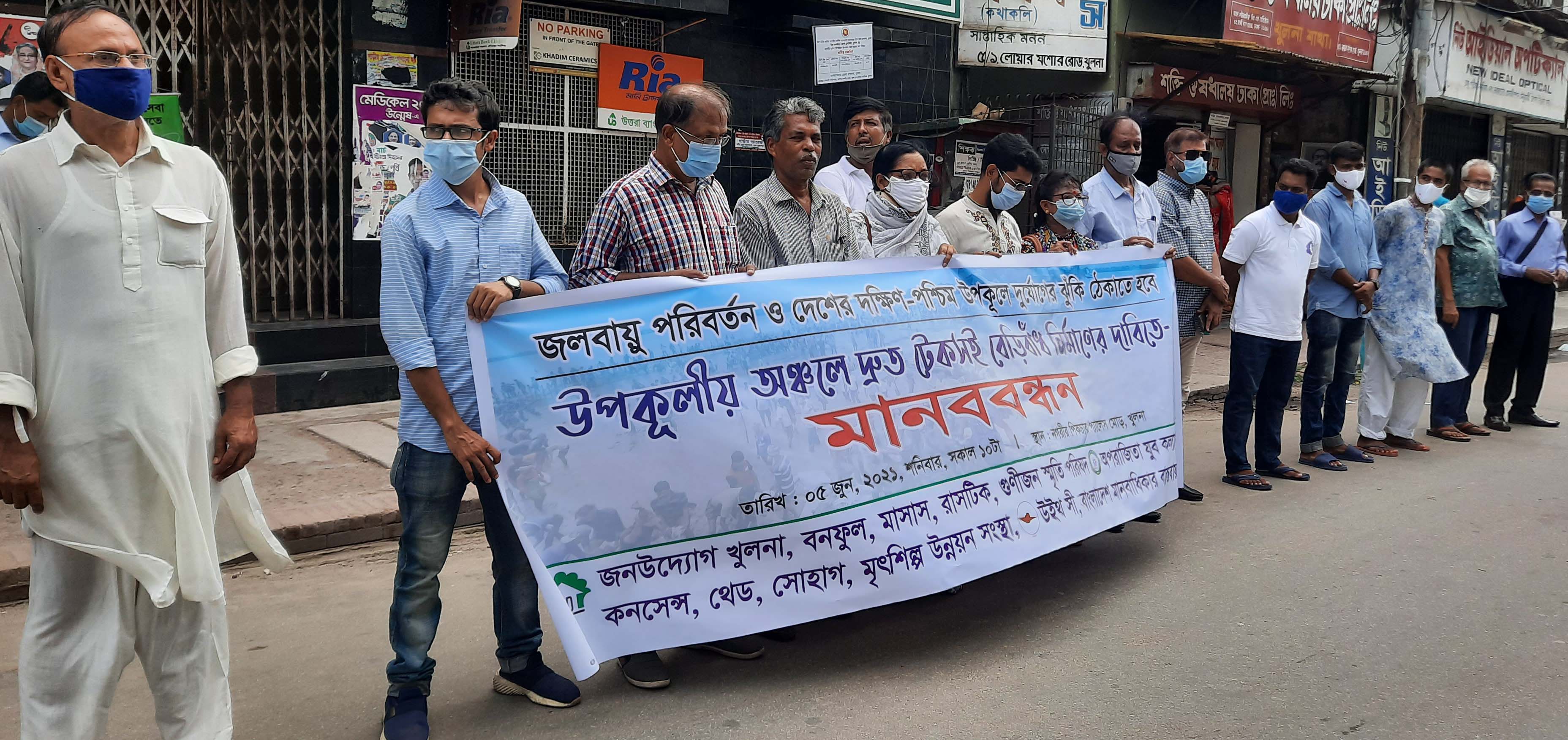 World Environment Day
World Environment Day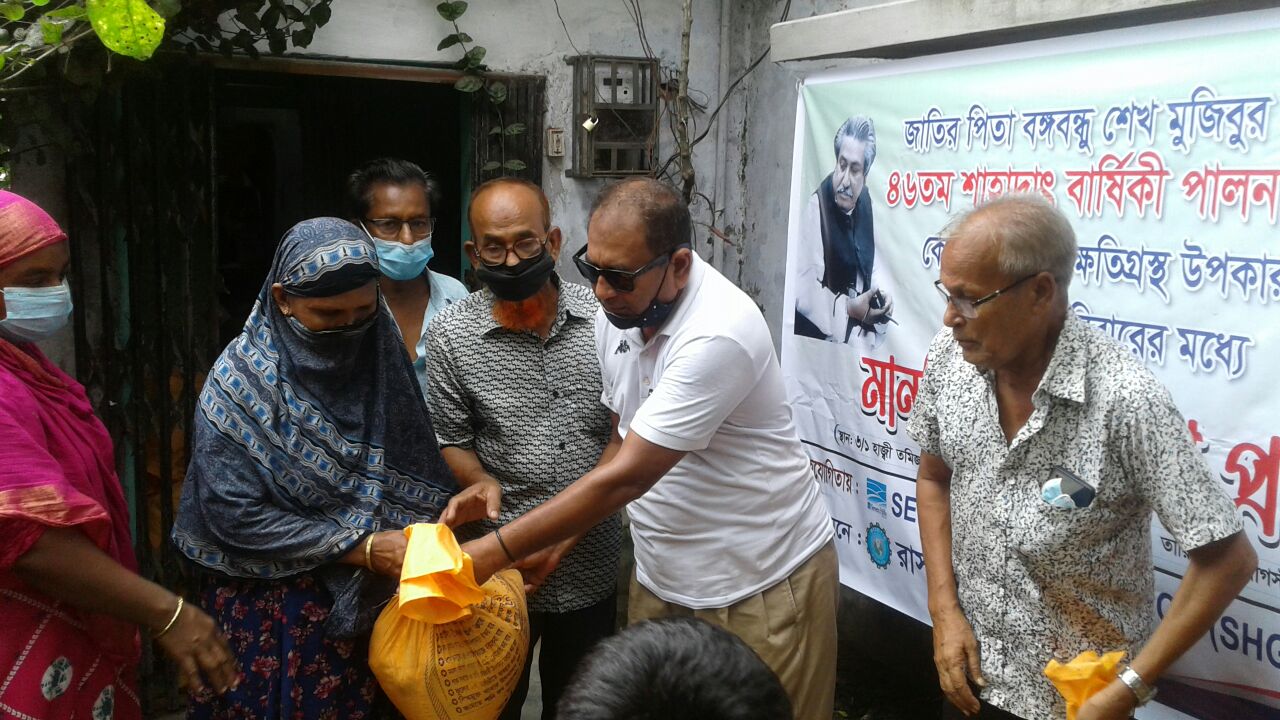 Food distribution for the disadvantaged community
Food distribution for the disadvantaged community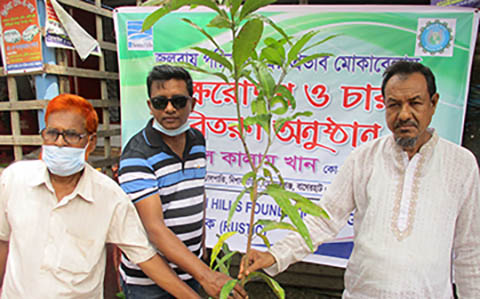 Tree Plantation for a green future
Tree Plantation for a green future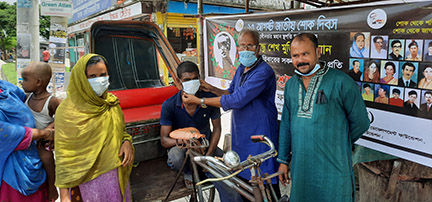 Distribution of personal safety materials to the disadvantaged community
Distribution of personal safety materials to the disadvantaged community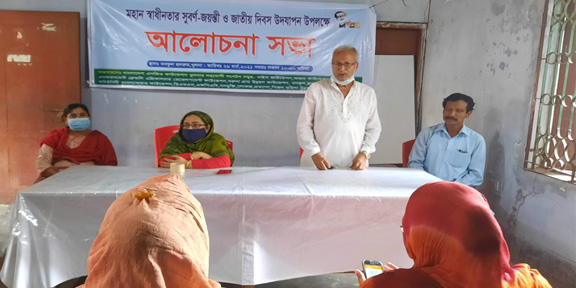 Observance of national days with the disadvantaged community
Observance of national days with the disadvantaged community